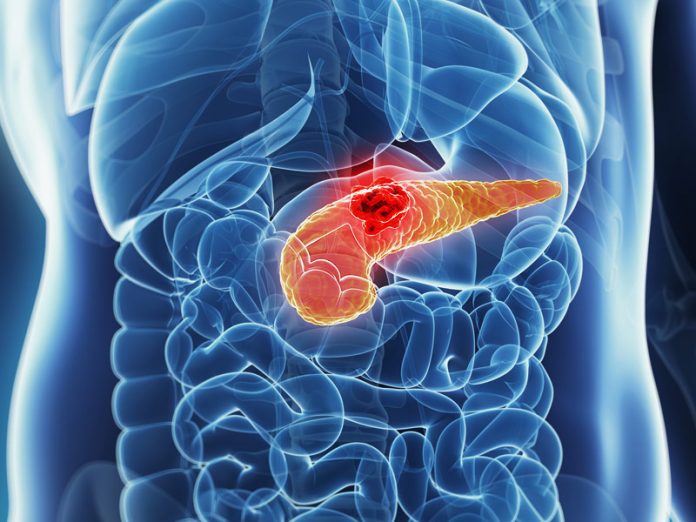A ground-breaking new pancreatic cancer trial, which aims to match patients with more targeted and effective treatments for their tumours has now opened in Manchester.
The new trial, part of Cancer Research UK’s Precision-Panc programme, has begun recruiting patients at The Christie.
Working with The University of Manchester, the trial will bring personalised, precision medicine to pancreatic cancer patients for the first time in the city.
Pancreatic cancer patients can now sign up to the entry point for Precision-Panc – the first step for patients to be recruited before enrolling onto a suitable clinical trial at the NIHR Manchester Clinical Research Facility at the Christie.
Each patient will undergo a tumour biopsy that will be used to help reveal the biological characteristics of the patients’ tumours. Samples will be studied by scientists at The University of Manchester as well as at the Wolfson Wohl Cancer Research Centre laboratories in Glasgow, and the results may then be used to help match patients to the most appropriate currently available clinical trial, testing treatments that are likely to work for that patient’s cancer.
Pancreatic cancer is the sixth most common cause of cancer death in the UK with a five-year survival of less than 3%. In the UK around 9,800 people are diagnosed with pancreatic cancer per yea and around 9,000 people die from the disease every year. In the North West around 1,100 people are diagnosed with pancreatic cancer every year and around 930 people die from the disease.
Professor Juan Valle, one of the lead researchers based at The Christie NHS Foundation Trust and professor in Medical Oncology at The University of Manchester, said: “This is an extraordinary opportunity to transform the therapeutic options and treatment pathway for pancreatic cancer patients. It is one of the first projects in the UK to bring genetic sequencing into the clinic in order to direct the care of pancreatic cancer patients.
“The overall aim of Precision-Panc is to make precision medicine a reality for more people with pancreatic cancer through building up knowledge that will ultimately allow clinicians to match patients with the most suitable treatment or clinical trial for them.
“The project aims to facilitate drug development, and ultimately new drug approval, allowing access and improving survival in patients with pancreatic cancer.”
Professor Valle, is working closely with the specialist multidisciplinary team, chaired by Professor Derek O’Reilly, from Manchester University NHS Foundation Trust, as well as with distinguished scientists in the Cancer Research UK Manchester Institute at The University of Manchester, Professor Caroline Dive and Dr Claus Jorgensen.
Dr Ian Walker, Cancer Research UK’s director of clinical research, said: “This trial is the first of its kind in Manchester and an important step towards exciting advances in the treatment of pancreatic cancer for patients in the city.
“Cancer Research UK is determined to streamline research, turning the latest laboratory discoveries into effective treatments and delivering them to patients. We hope that by increasing treatment options for this hard to treat disease through Precision-Panc, we can find the right approach for individual patients and give them the best chance of beating their cancer.”
Anna Jewell, Director of Operations at Pancreatic Cancer UK, said: “The clinical trial in Manchester will provide much-needed new treatment options for eligible patients with a disease which sadly has so few treatments available. We would encourage patients to ask their doctor or consultant if they think this trial would be suitable for them. People with the disease can also contact our specialist nurses on our free and confidential Support Line if they wish to find out more about the trial.
“It’s incredibly exciting to see the early stages of this game-changing effort to change the future for people with pancreatic cancer, and we are proud to support this vitally important work for everyone affected by this tough disease.”
The recruitment of patients to the clinical trial comes after Cancer Research UK announced in March last year a £1.2million funding boost for Manchester to help transform pancreatic cancer treatment in the UK as part of a £10million investment in the Precision-Panc project – based in several locations in the UK including Glasgow, Manchester and Cambridge.
The Precision-Panc team has spent the last year developing endoscopic biopsy techniques so that patients can provide samples for the Precision-Panc study as part of their routine diagnostic care – making it easier for patients to be able to enter these studies without additional tests.
Patients who think they might be suitable for the trial should talk to their oncologist.
Will Swindlehurst, aged 70, from Lymm, a pancreas cancer patient who was diagnosed and successfully operated on in 2012 at the Royal Liverpool Hospital, with six months follow-up of adjuvant chemotherapy, welcomed the research. Since his treatment William continues to be free of the disease and is enjoying a full, active and enjoyable life.
Will, who is Chair of the Liverpool Pancreas Patients Advisory Group, which supports research, treatment and care of Pancreas Patients and Chair of the annual Liverpool National Pancreas Patients and Public Forum, said: “Pancreas cancer is a disease which can have a devastating effect on the lives of patients, their families and friends.
“I was successfully treated for the disease and now live a full, active and enjoyable life.
“All research that can increase the chance of a successful outcome of the treatment of those diagnosed with the disease should be strongly supported and publicised.”







